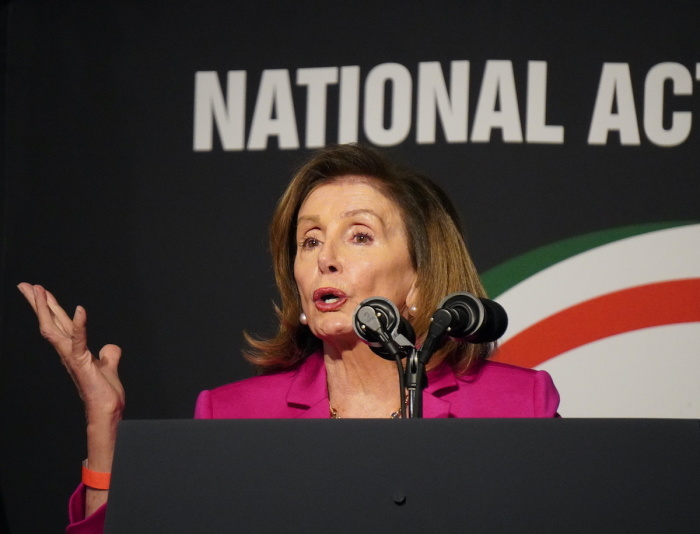Pelosi says she still receives communion despite archbishop's ban

Former House Speaker Nancy Pelosi, D-Calif., says she still receives communion in her home archdiocese despite the archbishop who governs that territory banning her from taking part in the sacrament due to her advocacy on behalf of legal abortion.
Pelosi, a practicing Roman Catholic and outspoken supporter of legal abortion who served as the top Democrat in the U.S. House of Representatives for two decades, stated in an interview with The National Catholic Reporter published Tuesday she has been receiving communion despite being instructed not to do so.
In 2022, Archbishop Salvatore Cordileone of the Archdiocese of San Francisco wrote a letter instructing Pelosi not to receive communion unless she opted to "repudiate her support for abortion rights."
"I received communion anyway," Pelosi told the news outlet. "That's his problem, not mine."
"My Catholic faith is, Christ is my savior," she added. "It has nothing to do with the bishops."
In his 2022 letter, Cordileone cited a 2004 letter sent by then-Cardinal Joseph Ratzinger, who would later become Pope Benedict XVI, to church leaders to justify his move to prevent Pelosi from receiving communion in the Archdiocese.
Ratzinger wrote that "when a person's formal cooperation becomes manifest (understood, in the case of a Catholic politician, as his consistently campaigning and voting for permissive abortion and euthanasia laws,) his Pastor should meet with him, instructing him about the Church's teaching, informing him that he is not to present himself for Holy Communion until he brings to an end the objective situation of sin, and warning him that he will otherwise be denied the Eucharist."
"When 'these precautionary measures have not had their effect …,' and the person in question, with obstinate persistence, still presents himself to receive the Holy Eucharist, 'the minister of Holy Communion must refuse to distribute it,'" Ratzinger added. Cordileone also pointed out that the Catholic Church's Code of Canon Law states that those "obstinately persevering in manifest grave sin are not to be admitted to holy communion."
In response to Pelosi's comments in the National Catholic Reporter, Cordileone issued a statement renewing his call for Pelosi's "conversion on the issue of human life in the womb, that it be consistent with the respect for human dignity she displays in so many other contexts."
"As a pastor of souls, my overriding concern and chief responsibility is the salvation of souls. And as Ezekiel reminds us, for a pastor to fulfill his calling, he has the duty not only to teach, console, heal and forgive, but also, when necessary, to correct, admonish and call to conversion," Cordileone said.
"One of the most the effective ways for a pastor to accomplish these duties is by way of dialogue, honest dialogue, where each party listens openly and honestly, seeking to understand the other, and being honest with one's own self. My own personal experience has taught me that this kind of dialogue can dispel misperceptions and melt away hostilities, and build new bonds of friendship. I therefore earnestly repeat once again my plea to Speaker Pelosi to allow this kind of dialogue to happen."
In 2021, the Catholic Church in the U.S. was embroiled in a debate about whether or not openly pro-abortion politicians should receive communion, as two of the top political leaders in the U.S. — Pelosi and President Joe Biden — were pro-abortion Catholics.
That year, the U.S. Conference of Catholic Bishops approved a document declaring that members of the Catholic laity "who exercise some form of public authority have a special responsibility to form their consciences in accord with the Church's faith and the moral law, and to serve the human family by upholding human life and dignity."
"As Christians, we bear the responsibility to promote the life and dignity of the human person, and to love and to protect the most vulnerable in our midst: the unborn, migrants and refugees, victims of racial injustice, the sick and the elderly," the document stressed.
The document stopped short of explicitly banning pro-abortion Catholic politicians from communion. In response to speculation and concern that it would do so, the U.S. Conference of Catholic Bishops released a statement maintaining that "the question of whether or not to deny any individual or groups Holy Communion was not on the ballot" when the bishops decided to move forward with crafting a "Document on the Meaning of the Eucharist in the Life of the Church."
"The document being drafted is not meant to be disciplinary in nature, nor is it targeted at any one individual or class of persons," the statement continued. "It will include a section on the Church's teaching on the responsibility of every Catholic, including bishops, to live in accordance with the truth, goodness and beauty of the Eucharist we celebrate."
Ryan Foley is a reporter for The Christian Post. He can be reached at: ryan.foley@christianpost.com




























